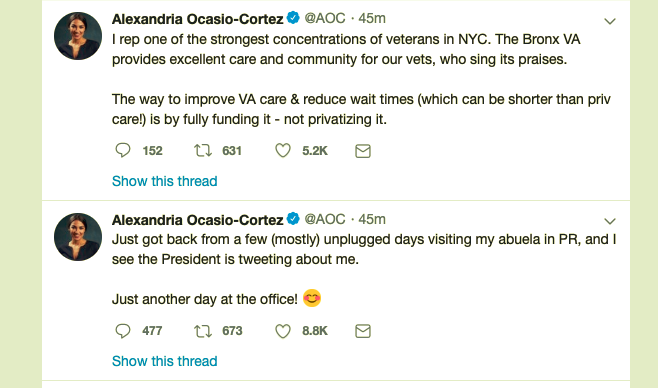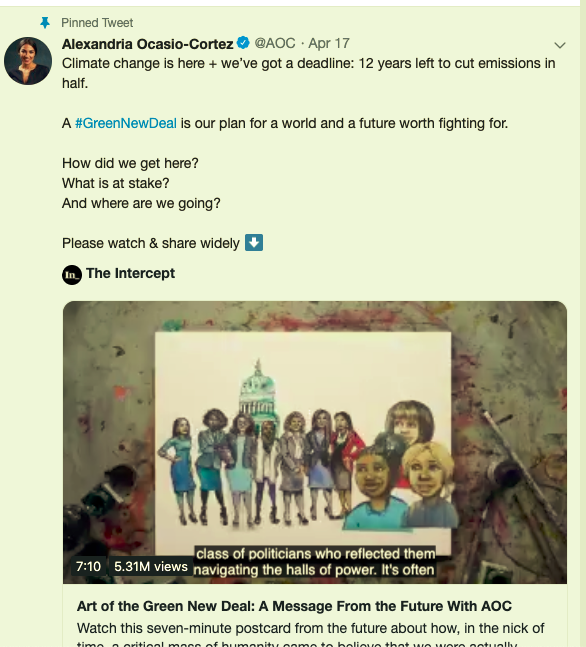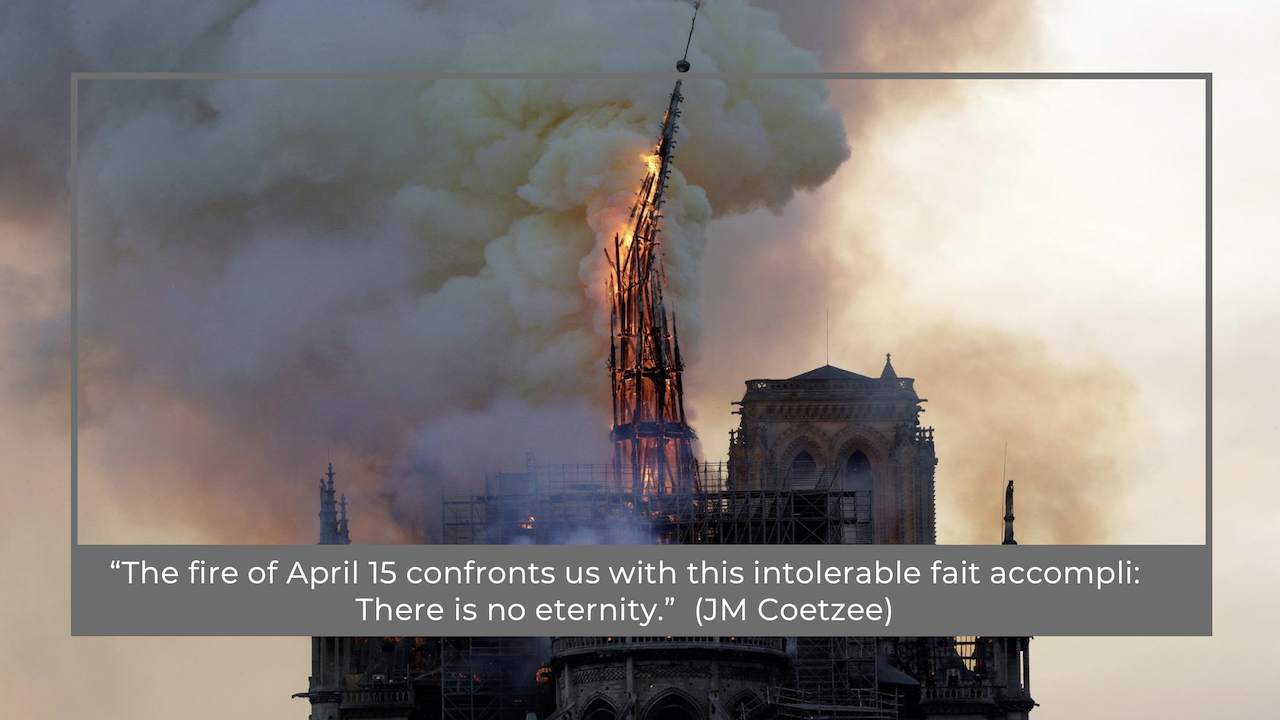April 25, 2019
The Compassionless Future Has Arrived
Forget the furore over the “Easter worshippers versus Christian” Tweets by the former US President Barak Obama, and the former (soon to be again?) Presidential nominee, Hillary Clinton, about the Sri Lankan bombings.
It’s the lack of any social media comment by the up and coming star of the Democrats in the US that is the really interesting thing.
New York Democrat Representative, Alexandria Ocasio-Cortez, the future of the party, if many voices are to be believed, has said nothing on Twitter about the bombings, – or on any social media site – despite this atrocity being the biggest single act of terrorist violence in the last decade.
And it’s not as if she is not a constant voice on social media. As of 11:30am Perth time, here are her last Twitter activities:



Her silence is being compared/contrasted with the fourteen tweets she issued after the Christchurch massacre, so it’s not as if she’s a NY Democrat who believes the world revolves around that particular city.
Ocasio-Cortez has global reach and global interest, and is touted as a future Presidential nominee (At 29 years of age she is six years shy of being eligible to nominate). And if she’s smart – which she is – she’s got a media team around her curating her, if only to ensure she doesn’t blow it all with an uncurated, and Presidential campaign-puncturing “half-basket of deplorables” comment.
Her silence is a far more interesting story that Obama and Clinton’s conceived word play. Why? Because in part it telescopes the future of party politics in the USA.
I’m sure there will be lots of “yes, buts” to explain her silence, but just as I don’t think poorly of Obama and Clinton for their tweets, I do think poorly of Ocasio-Cortez. And the fact that she is being touted as the kinder, gentler face of a future we all want, is even more disconcerting.
And more importantly, I think it’s a signal that the current fractured social and political contract in the West is set to fracture further into the future. For as I read it Obama and Hillary were reflexive in their responses. Reflexive, but compassionate none-the-less.
If they were playing the culture wars – which may or may not be the case – they were not blind to the awful deeds done. Both expressed shock and revulsion and, more importantly, a strong identity with the sufferers. They were not being anti-Christian at all.
I think their “Easter worshippers” comment was what New York social psychologist, Jonathan Haidt, would call, an instinctive reflex. The elephant going one way, and the jockey leaning in, so to speak, as he writes of in his book The Righteous Mind.
Their statements were, given their left-leaning political, social and moral frameworks, their best efforts at showing solidarity with Christians suffering for their faith at the hands of terrorists, while taking all of their other concerns (Islamophobia for instance) into consideration. You may not agree with that, but they did not express blind indifference. And they certainly didn’t express nothing.
Both are self-avowedly liberal in their Christian framework, in word and action, so at the same time, let’s concede that they did not want to give oxygen to those who with whom they are deeply divided on religious matters.
Yet it’s instructive that President Trump did not mention “Christians” either. If we’re talking about reflexive statements, he mentioned “churches and hotels”, buildings that house people, but not people themselves. Not worshippers.
I’ve seen at least one cheeky/churlish comment that suggests we take Trump at his word, and assume that he mentioned “hotels” because he’s a businessman with a vested interest in the industry.
All of which goes to show that the reflexive move towards what our preferred social stance (more progressive versus more conservative) colours how we interpret the words that people say.
But how do we interpret silence? And more so, from someone who normally doesn’t only not do silence, as social media is concerned, but who is a constant and noisy presence?
Clinton, Obama and Trump showed compassion. The compassion of world figures who have seen much suffering and, let’s face it, have been party to much of the suffering around the world also. They’re not clean-skins, and they probably know it too.
But not Ocasio-Cortez. No compassion. Not publicly. Not for this at least. And I think that’s a signal for how this divide is going to go in the future. I do think it’s a line in the sand, and in a sense a much colder, braver line in the sand than Obama kept drawing and rubbing out.
For there are no such insecurities from the new breed of leaders in our hardening secular world. I doubt whether Ocasio-Cortez will let a few Breitbart or FoxNews reports shame her into putting out something on social to keep the peace. Not for the sake of public compassion anyway.
But let’s not just blame Ocasio-Cortez. She is the future of this Western world – Left and Right.
Obama at 57 is the younger face of the Baby Boomers, but he’s had his day. Hillary? Over seventy years of age. They’re the old guard who have often allowed compassion – Christian compassion for those they disagree with (love your enemies etc) – to distract themselves from the task of leading us to a bright zealous Utopia.
Trump, ironically, for all his support from non-church-going self confessed evangelicals (a rare breed unheard of in the rest of the West), is more post-Christian than either of them. But still, he’s a product of his Christianised time. But that time has past, whether he stays on as President until 2024.
Expect no such sentimental slip ups from the new breed, Left or Right. That’s why their Twitter accounts will stay firmly silent when atrocities inconvenience their narratives. On both sides. The cause is too important to show compassion for their cultural enemies.
And I guess we could put the words “refugees” and “abortion” into that mix and see how we fare when it comes to what we focus on, and where our reflexes takes us in terms of compassion.
Writing in the online journal The Week, after the election of Trump, Pascal-Emmanuel Gobry writes about the growing secularism in America, and its inability to provide a common language or platform for people to disagree safely.
The title of his essay? “If you didn’t like the Christian right, you’ll really hate the post-Christian right.” To which we might add the post-Christian left.
Gobry concludes his essay with these sobering words:
The secularization of America can have another effect. When America was a majority Christian nation, it was also a less polarized nation. It’s hard not to see that Christianity played a role by providing a common language that helped bridge partisan differences. A secularized America is going to have a much more extreme right wing, but also a much more extreme left wing, and fewer ways for them to interact and talk. Welcome to the future.
Ocasio-Cortez’s silence on Twitter suggests that the future is now.
Written by
There is no guarantee that Jesus will return in our desired timeframe. Yet we have no reason to be anxious, because even if the timeframe is not guaranteed, the outcome is! We don’t have to waste energy being anxious; we can put it to better use.
Stephen McAlpine – futureproof
Stay in the know
Receive content updates, new blog articles and upcoming events all to your inbox.


